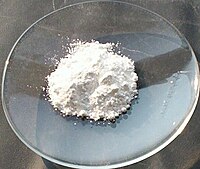
Photo from wikipedia
Visceral leishmaniasis (VL) is an endemic fatal infectious disease in tropical and subtropical nations. The limited treatment options, long treatment regimens, invasive mode of administration of drugs, and lack of… Click to show full abstract
Visceral leishmaniasis (VL) is an endemic fatal infectious disease in tropical and subtropical nations. The limited treatment options, long treatment regimens, invasive mode of administration of drugs, and lack of effective vaccination are the main reasons for the search of new alternative therapeutics against VL. On this quest, from a series of eugenol derivatives, we had demonstrated eugenol oleate as a lead immunomodulatory anti-VL molecule earlier. In this report, the oral efficacy and mechanism of eugenol oleate in inducing immunomodulatory anti-VL activity has been studied in BALB/c mice model. The plasma pharmacokinetic and acute toxicity studies suggested that the eugenol oleate is safe with an appreciable pharmacokinetic profile. Eugenol oleate (30 mg/kg B.W.) showed 86.5% of hepatic and 84.1% of splenic parasite clearance. The increased Th1 cytokine profile and decreased Th2 cytokine profile observed from ELISA and qRTPCR suggested that the eugenol oleate induced the parasite clearance through the activation of the host immune system. Subsequently, the mechanistic insights behind the anti-leishmanial activity of eugenol oleate were studied in peritoneal macrophages in vitro by inhibitor response study and immunoblotting. The results inferred that eugenol oleate activated the PKC-βII-p38 MAPK and produced IL-12 and IFN-γ which intern activated the iNOS2 to produce NO free radicals that cleared the intracellular parasite.
Journal Title: Cytokine
Year Published: 2020
Link to full text (if available)
Share on Social Media: Sign Up to like & get
recommendations!